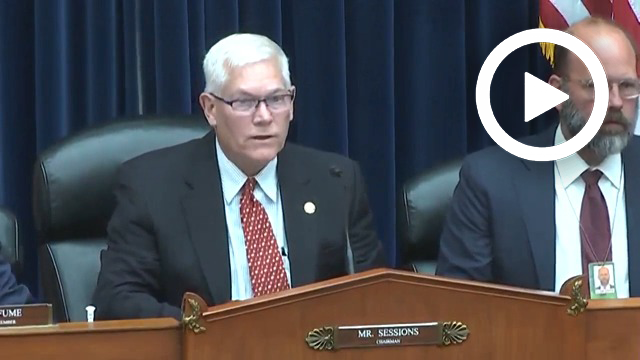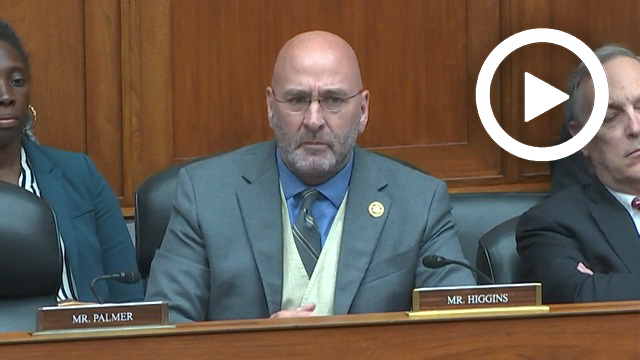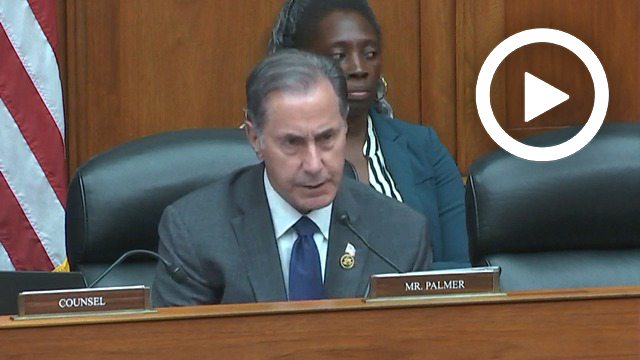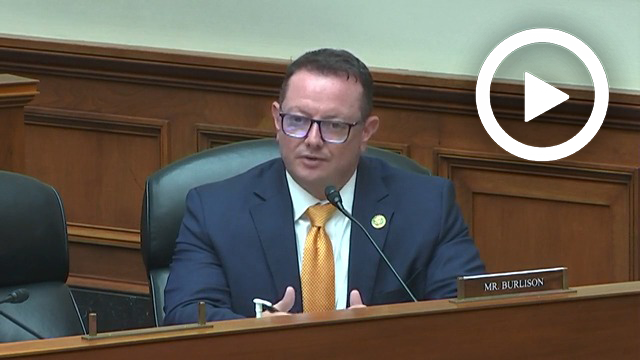Hearing Wrap Up: Proactive Oversight is Necessary to Ensure DOD Moves Toward a Clean Financial Audit
WASHINGTON—The Subcommittee on Government Operations and the Federal Workforce today held a hearing titled “Tracking Progress: Examining the Department of Defense’s Financial Management Practices” to bring transparency to the Department of Defense’s (DOD) financial management practices and progress towards obtaining a clean audit of DOD finances.
KEY TAKEAWAYS:
American taxpayers deserve to know if DOD is being a good steward of its budget. There are concerns about why the $4.1 billion DOD has spent on audit remediation has continued to receive failed results.
- DOD has been unable to get a clean audit for thirty years and is the only federal agency never to achieve a clean audit opinion.
- “The financial statement audits performed or overseen by the DOD Office of Inspector General are critically important for maintaining the public’s trust, ensuring accountability, and improving DOD operations,” Mr. Brett Mansfield, Deputy Inspector General for Audit at the U.S. Department of Defense Office of the Inspector General, said.
While the Marine Corps has made progress as an entity within DOD towards passing a clean audit, there is still work to be done to achieve a clean audit by the December 28, 2028, deadline.
- The Oversight Committee, with assistance from the Government Accountability Office (GAO), developed a Financial Management Scorecard to track progress towards achieving a clean audit option in the future. The categories and indicators on the scorecard are key building blocks necessary to support and track progress towards achieving positive audit results.
- Mr. Tom Steffens, Special Assistant to the Comptroller at the U.S. Department of Defense reported on DOD’s progress during his opening statement. “We continue to assess, upgrade, consolidate, and retire systems that are impacting our ability to financial report successfully.”
It is important that leadership and general officers are held accountable for sustaining progress and addressing significant issues that might stand in the way of obtaining a clean audit.
- According to the GAO, one of the biggest reasons DOD cannot pass a financial audit is because it spends billions of dollars each year on outdated financial systems.
- Mr. Brett A. Mansfield, Deputy Inspector General for Audit at the U.S. Department of Defense Office of the Inspector General, discussed the results of a recently released Office of Inspector General report outlining the Fiscal Year ’23 financial statement audits. “First, the Comptroller and financial management community cannot do it alone. Leadership involvement from the commanders and operators is imperative. […] Second, the inability to support its financial statements is inherently an operational risk for the DOD. […] Third, material weaknesses are longstanding and persistent.”
- During the hearing, Mr. Steffens said that leadership commitment should be DOD’s biggest priority for meeting Congress’s deadline.
MEMBER HIGHLIGHTS:
Subcommittee Chairman Pete Sessions (R-Texas) discussed the DOD Financial Management Scorecard and its usefulness for measuring financial management.
Rep. Sessions: “When we look at this, I notice there are ‘Fs’ on System Compliance with Financial Requirements. Take a minute and tell me how we make that better.”
Mr. Khan: “This grade is in part self-reported by the military services and in part it’s also because of a lack of reporting by the IPAs. The Federal Financial Management Improvement Act requires compliance with three specific categories. It is compliance with federal financial management systems requirements, it is compliance with federal financial accounting standards and it’s also compliance with the U.S. Standard General Ledger.”
Rep. Sessions: “Are we asking the right thing of them?”
Mr. Khan: “Yes sir. It’s essential because of the size and complexity of the military departments that this compliance be attained.”
Rep. Sessions: “Is this grade fair that has been placed upon this DOD organization?”
Mr. Steffens: “I believe it’s fair. I respect the grade. I respect the process that was going through and the intent here to try to get to a baseline here of how the departments are doing. What I’d offer though as supplemental to the report card here, the scorecard that was given, there are other ways that we are looking foundationally to try to assist the military departments to getting there as well.”
Rep. Clay Higgins (R-La.) examined the need for accountability and transparency within DOD related to the use of its budget.
Rep. Higgins: “The Department of Defense receives more funding than any other federal agency – more than half of federal discretionary spending goes to DOD. Yet it’s the only federal agency not to achieve a clean audit opinion. Mr. Mansfield, I’m going to be directing my question at you.
[…]
“Let’s just go through the timeline here. This is one large interaction between Austal shipyards and the DOD, the United States Navy, that has been going on for a long time. February 2017, wide media reports highlight concerns about China’s frigate design resembling the United States Navy’s literal combat ship, the LCS. That coincides with Austal USA’s joint venture with a Chinese shipbuilder.
[…]
“2022, September, myself and Congressman Dunn expressed national security concerns officially to DHS and Navy Secretaries about Austal USA’s OPC contract amidst the LCS program scrutiny. In 2023, a federal grand jury indites three individuals with accounting fraud at Austal USA related to LCS contracts. July 2023, myself and Congressman Dunn sent a letter to the Navy OIG requesting an investigation into Austal USA regarding connections to China and its ongoing mystery of money and contracts being awarded for steel vessels when they’ve never built a steel vessel.”
“Mr. Mansfield, does this rise to the level of reasonable suspicion in the financial realm, sir? Are you familiar with any of these investigations that allegedly have taken place within the IG’s office?”
Mr. Mansfield: “Sir, so I focus on audits, not criminal investigations, but I am familiar with the public disclosure discussions regarding the settlements reached by DOJ.”
Rep. Higgins: “I’m honored to fund the Department of Defense, but we can’t continue to operate without some degree of accountability for this money – it’s almost a trillion dollars a year now – when you have things like this going on. It just blows the minds of Americans that witness it.”
Rep. Gary Palmer (R-Ala.) asked about GAO’s role in working with DOD towards a clean audit.
Rep. Palmer: “I want to raise some questions, Mr. Chairman, about what the GAO has tried to do in terms of getting more accuracy from the Department of Defense. Despite the massive spending, the only federal agency in the country that has failed to pass an independent audit, they’ve remained on the GAO high risk list for waste, fraud, and abuse for thirty-four years. […] How much insight and influence do you have into ensuring that the money is being well spent?“
Mr. Steffens: “I believe sir, that we are getting definitely still need more accountability from the Secretary and Deputy Secretary on this.“
Rep. Palmer: “But how do you account for the fact that you can’t pass an audit? Are the systems being modernized? Are new systems being built? I mean what improvements are you making?”
Mr. Steffens: “We have to approach it from about four or five different fronts. Mr. Khan came to the House Armed Services Committee I think about thirteen years ago with six imperatives I think that need to be. All of them are important.“
Rep. Palmer: “But you never implement them?”
Mr. Steffens: “Well we’re working on each one of them…”
Rep. Eric Burlison (R-Mo.) discussed the feasibility of DOD successfully reaching Congress’s mandated deadline for obtaining a clean audit.
Rep. Burlison: “Congress has mandated that DOD achieve a clean audit by December 28th of 2028. My question to each one of you on the panel is do you think that that will happen?”
Mr. Steffens: “It’s a great question, and I know there’s a lot of concern expressed about that date and can we meet that date. It will definitely be a challenge, but I believe if we have a couple of key elements in place I think we can do it. Leadership commitment is first and foremost. More important even than the resources is the sense of priority that our leadership has to have on this.”
Mr. Mansfield: “Our role as the Inspector General is to perform the audit. I am very hesitant to make any predictions before we’ve actually done the work, so I’m going to refrain from saying whether they will pass or not. What I’m going to echo is what Mr. Steffen said. There’s a lot of work to do before they get there.”
Mr. Khan: “I think there will be early indicators whether or not they can meet that timeline. The system is going to drive that, having a compliance system across the department. They have to be in place, in our view, by the end of Fiscal Year 2026 so that they can begin to process transactions in ’27 and ’28 to be able to reach an opinion by that date.”
READ MORE: Sessions Opens Hearing on Tracking Progress in Improving DOD’s Financial Practices



